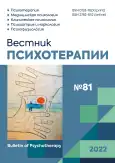Conscience and dialogue with the imaginary other in analytical-cathartic therapy
- Authors: Alexandrov A.A.1
-
Affiliations:
- North-West State Medical University named after I.I. Mechnikov
- Issue: No 81 (2022)
- Pages: 26-39
- Section: Psychotherapy
- URL: https://bakhtiniada.ru/0132-182X/article/view/310668
- DOI: https://doi.org/10.25016/2782-652X-2022-0-81-26-39
- ID: 310668
Cite item
Full Text
Abstract
Relevance. According to the concept of analytical-cathartic therapy, neurosis and other emotional disorders are based on an unconscious internal conflict in the sphere of moral relations of the individual, which is expressed in the form of an internal dialogue between the «generalized Other» (alter ego, conscience) and the «concrete Other» (imaginary significant Other). The article presents the author’s position on the role of the phenomenon of conscience and the importance of dialogue with an imaginary Other in the framework of analytical-cathartic therapy, which is extremely important for psychotherapeutic practice. Intention. To analyze the phenomenon of conscience from the standpoint of V.N. Myasishchev’s psychology of relationships, as well as the ideas of existentialism in their significance for the theory and practice of analytical-cathartic therapy. Methodology. The phenomenon of conscience is analyzed theoretically, from the standpoint of relationship psychology it is considered as a unity of structure and process. The author’s position of positive and negative interpretation of conscience is stated; the concepts of morality and ethics are compared within the framework of the concept of analytical-cathartic therapy. Results and Discussion. The article analyzes the phenomenon of conscience from the standpoint of the psychology of relationships and the ideas of existentialism, compares the concepts of morality and ethics, pays special attention to the dialogue with the imaginary Other, examines the functions of the Self, the significant Other and the psychotherapist. These data significantly complement the modern understanding of the essence of the concept of analytical-cathartic therapy and they have an important applied psychotherapeutic value, which is demonstrated by the example of working with a seminar participant. Conclusion. It is necessary to introduce theoretical knowledge and practical skills of analyzing the phenomenon of conscience within the framework of the dialogue of a person with an imaginary Other, taking into account the positions of the Self, the significant Other and the therapist. This ensures that the patient is aware of the essence of the internal conflict, understands his own role in emerging interpersonal conflicts and creates prerequisites for reconstruction of disturbed personal relationships.
About the authors
A. A. Alexandrov
North-West State Medical University named after I.I. Mechnikov
Author for correspondence.
Email: dr.artaleks@ya.ru
Kirochnaya Str., 41, St. Petersburg, 191015
References
- Alexandrov A.A. Analitiko-katarticheskaya terapiya emocional’nyh narushenij [Analytical and cathartic therapy of emotional disorders]. Sankt-Petersburg. 2017. 231 p. (In Russ.)
- Alexandrov A.A. Katarsis, insajt i integraciya lichnosti v analitiko-katarticheskoj terapii [Catharsis, insight and integration of personality in analytic-cathartic therapy]. Vestnik psikhoterapii [The Bulletin of psychotherapy]. 2020;(75):7–29. (In Russ.)
- Alexandrov A.A. Polifonicheskaya koncepciya soznaniya Mihaila Bahtina v ee znachenii dlya analitikokatarticheskoj terapii [Mikhail Bakhtin’s polyphonic concept of consciousness in its meaning for analytic-cathartic therapy]. Vestnik psikhoterapii [The Bulletin of psychotherapy]. 2021;(79):7–23. (In Russ.)
- Bakhtin M.M. Problemy poetiki Dostoevskogo [Problems of Dostoevsky’s poetics]. Sankt-Petersburg. 2017. 416 p. (In Russ.)
- Bibler V.S. Nravstvennost’. Kul’tura. Sovremennost’ [Moral. Culture. Modernity]. M. 1990. 62 р. (In Russ.)
- Gusejnov A.A. Pervaya filosofiya kak nravstvennaya filosofiya [The First Philosophy as Moral Philosophy]. Voprosy filosofii. 2017;(6):65–74. (In Russ.)
- Dal’ V.I. Tolkovyj slovar’ russkogo yazyka [Explanatory dictionary of the Russian language]. Moscow. 2003. 736 p. (In Russ.)
- Il’in E.P. Psihologiya sovesti: vina, styd, raskayanie [Psychology of conscience: guilt, shame, repentance]. SanktPetersburg. 2017. 288 p. (In Russ.)
- Lejbin V.M. Kratkij psihoanaliticheskij slovar’-spravochnik [Brief psychoanalytic dictionary-reference]. Moscow. 2015. 192 p. (In Russ.)
- Masterov D.V. Razlichie morali i nravstvennosti: k postanovke problem [Difference between ethics and morality: problem statement]. Zhurnal teoriya i prartira obschestvennogo razvitiya [Theory and practice of social development]. 2012;(9):32–34. (In Russ.)
- Myasishchev V.N. Psihologiya otnoshenij [Psychology of relationships ]. Moskva ; Voronezh. 1995. 356 p. (In Russ.)
- Rubinshtejn S.L. Bytie i soznanie [Being and consciousness]. Sankt-Petersburg. 2012. 288 p. (In Russ.)
- Serdyuk T.S. Problema opredeleniya sovesti v filosofii morali [The problem of providing an accurate definition of conscience]. Izvestiya Altaiskogo gosudarstvennogo universiteta[Izvestiya of Altai State University]. 2011;(2):199–201. (In Russ.)
- Trunov D.G. Vvedenie v fenomenologiyu samopoznaniya [An introduction to the phenomenology of selfknowledge]. Perm. 2008. 255p. (In Russ.)
- Florenskaya T.A. Dialog v prakticheskoj psihologii. Nauka o dushe [Dialogue in practical psychology. The science of the soul]. Moscow. 2000. 139 p. (In Russ.)
- Shrejder YU. A. Lekcii po etike [Lectures on ethics]. Moscow. 1994. 136 p. (In Russ.)
- Yalom I. Ekzistencialnaya psikhoterapiya [Existential psychotherapy]. Moscow. 1999. 312 p. (In Russ.)
Supplementary files










